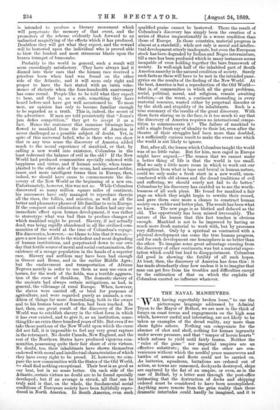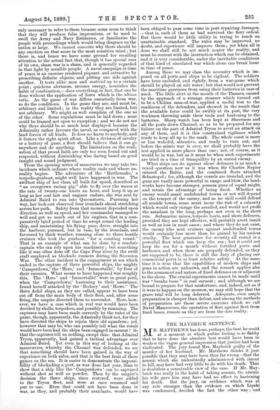THE NAVAL MANCE1TVRES.
" WAR having regrettably broken loose," to use the picturesque language addressed by Admiral Tryon to the Mayor of Belfast, we are now in the thick of forays on coast towns and engagements on the high seas which, however useful and interesting, are not likely to be taken as examples of the dread reality, any more than sham fights ashore. Nothing can compensate for the absence of shot and shell, nothing for human ingenuity under severe pressure, and that " temper of heroic hearts " which refuses to yield until fairly beaten. Neither the " rules of the game " nor impartial umpires are an effective substitute ; the one and the other are con- veniences without which the needful peace manoeuvres and battles of armies and fleets could not be carried on. As batteries, squadrons, battalions are ordered out of action, so towns are ransomed, dockyards destroyed, ships are captured by the fiat of an umpire, or even, as in the case of Belfast, by a letter sent through the post-office intimating that the destruction of docks and shipping ordered must be considered to have been accomplished. Anything more remote from the grim reality than these dramatic interludes could hardly be imagined, and it is only necessary to refer to them because some seem to think that they will produce false impressions, or be used to swell the Army and Navy Estimates, or familiarise the people with proceedings which would bring disgrace on the nation at large. We cannot conceive why there should be any emotion on that score in the most sensitive mind ; but there is, and hence we have some ground. for recalling attention to the actual fact that, though it has special uses of its own, sham war is a sham, and is generally regarded in that light by sensible people. A naval campaign in time of peace is an exercise rendered piquant and attractive by prescribing definite objects, and pitting one side against another. It tests alike men and materiel up to a certain point; quickens alertness, arouses energy, nourishes the habit of combination,—does everything, in fact, that can be done without the application of force which is the ultimo. ratio. As the game of war differs essentially from war, so do the conditions. In the game they are, and must be, arbitrary and limited ; in the reality they are limited, but not arbitrary. We might as well complain of the one as of the other. Some regulations must be laid. down ; none could be framed not open to exception ; and we do not see why there should be so much heat displayed because the Admiralty rather favours the naval, as compared with the land forces of all kinds. It does no harm to anybody, and it fosters the right spirit afloat. Like a division of cavalry or a battery of guns, a fleet should believe that it can go anywhere and do anything. The limitations on the reali- sation of that proud faith are only too soon found out and respected, without diminishing wise daring based on good insight and sound judgment.
From the opening series of manoeuvres we may take two incidents which indicate where reality ends and where un- reality begins. The adventure of the Rattlesnake,' a torpedo-gunboat, might well have happened in war. The swiftest ship of her class, all built for speed, described as " an overgrown racing gig," able to fly over the waves at the rate of twenty-one knots an hour, and keep it up as long as her coal last and engines endure, she was sent by Admiral Baird to run into Queenstown. Pursuing her way, her look-out observed four ironclads ahead stretching across her path. Safety from that moment depended upon direction as well as. speed, and her commander managed so well and got so much out of his engines, that in a com- paratively brief period of time he swept round the leading ship, and maintaining his flying pace, drove straight into the harbour, pursued, but in vain, by the ironclads, and favoured by thick weather, running close to three hostile cruisers who took the gunboat " for a coasting vessel." That is an example of what can be done by a resolute captain who can rely upon his machinery ; but something like it was often done off the Cape Fear river by the swift craft employed as blockade runners during the Secession War. The other incident is the engagement at sea which ended in the capture of three powerful ships, the mighty Camperdown,' the Hero,' and 'Immortalit6,' by four of their enemies. What seems to have happened was roughly this. The Hero' and Immortalite ' were in great peril, when the Camperdown,' hastening to their assistance, found herself attacked by the Rodney' and Howe.' The three Achil ships, as they are called, appear to have been cut off from the main body of their fleet, and, after some firing, the umpire directed them to surrender. Here, how- ever, we have a. case which in real war would have been decided by shells, torpedoes, and possibly by ramming. The captures may have been made correctly by the rules of the game, though, apparently, the Admiralty think not, for they have directed the ships to rejoin their old squadron ; yet, however that may be, who can possibly tell what the result would have been had the ships been engaged in earnest ? So that the captures tell us nothing, except this : that Admiral Tryon, apparently, had gained a tactical advantage over Admiral al Baird. Yet even in this way of looking at the manoeuvres, whereby the Channel was defended, we see that something should have been gained in the way of experience on both sides, and that is the best fruit of these games on the sea. It is easier to demonstrate the impossi- bility of blockading a port, as was done last year, than to show that a ship like the Camperdown ' can be captured without shot as well as powder. Then by the umpire's decision the three ships, since restored, were added to the Tryon fleet, and were at once renamed and put to use. Even that could not have been done in war, as they, and probably their assailants, would have been obliged to pass some time in port repairing damages, —that is, such of them as had survived the fiery ordeal. But there would be little utility in trying to reach an unattainable standard. The rules may be improved, no doubt, and experience will improve them ; yet when all is done we shall still be not much nearer the reality, and must be content with the instruction which can be obtained, and it is very considerable, under the inevitable conditions of that kind of simulated war which alone can break loose in time of peace.
Among these we may class the necessity which is inY- posed on all ports and ships to be vigilant. The soldiers have been excluded, and rightly, from a war-game which should be played on salt water; but that would not prevent the maritime garrisons from using their batteries in case of need. The little alert at the mouth of the Thames, caused by the approach of a strange steamer which turned out to be a Chilian man-of-war, applied a useful test to the readiness of the defenders, and showed in the result that the available force could be swiftly at its post, the very workmen throwing aside their tools and hastening to the batteries. Sharp watch has been kept at Sheerness and all the ports down Channel, so as to be prepared for any failure on the part of Admiral Tryon to avert an attack on any of them, and it is this constrained vigilance which tends to keep all up to the mark. The whole coast is more or less wakeful, attentive, and ready to turn out, and before the mimic war is over, we shall probably have the test applied in more places than one ; not, of course, as it would be in war, but as it must be when such experiments are tried in a time of tranquillity by an unreal enemy. What ships can do against shore defences is as much a vexed question now as it was when Sir Charles Napier entered the Baltic, and the combined fleets attacked Sebastopol ; for, although the vessels are ironclad, and the guns are vastly more powerful in range and blow, the land- works have become stronger, possess guns of equal might, and retain the advantage of being fixed. Whether an enemy would assail undefended towns or not will depend on the temper of the enemy, and as no skill could defend all seaside towns, some must incur the risk of a calamity which would only enrage the assailed, and would not profit the assailant in the long, perhaps not even in the short run. Submarine mines, torpedo boats, and shore defences, provided they are kept effective, will probably avert insult as well as loss in most cases ; and where they do not exist, the enemy who sent cruisers against undefended towns would certainly lose more than he gained by his useless cruelty. The best guarantee for security all round is a powerful fleet which can keep the sea ; but it could not keep the sea for a month without fortified ports and harbours, and when these are properly defended, as they are supposed to be, there is still the duty of placing our commercial ports in at least relative safety. At the same time it is true that the capabilities of modern ships and guns in action are unknown, and the remark applies also to the armament and nature of 4xed defences on or adjacent to the shore. The crucial experiments cannot be made until war " breaks loose " in real earnest ; and although we are bound to prepare for that misfortune, and, indeed, act as if it were to happen on the morrow, we may still hope that the grave trial will be long deferred. Adequate, even ample preparation is cheaper than defeat, and among the methods of preparation are those severe exercises which we call Naval Manoeuvres, the operation of fleet against fleet from fixed bases, remote as they are from the dire reality.



































 Previous page
Previous page